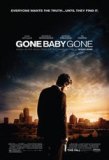| Reviews & Columns |
|
Reviews DVD TV on DVD Blu-ray 4K UHD International DVDs In Theaters Reviews by Studio Video Games Features Collector Series DVDs Easter Egg Database Interviews DVD Talk Radio Feature Articles Columns Anime Talk DVD Savant Horror DVDs The M.O.D. Squad Art House HD Talk Silent DVD
|
DVD Talk Forum |
|
|
| Resources |
|
DVD Price Search Customer Service #'s RCE Info Links |
|
Columns
|
|
|
Gone Baby Gone
When a little girl is abducted from her Boston home, relatives (including Amy Madigan) hire private investigators Patrick Kenzie (Casey Affleck) and Angie Gennaro (Michelle Monaghan) to help augment the search. Hitting the local dives to rustle up clues to the girl's whereabouts, Kenzie starts to share information with two cops (Ed Harris and John Ashton) who are working the case. With the coked-up mother (Amy Ryan, in an incredible performance) deceptive and the police captain (Morgan Freeman) seemingly unaware of the details, Kenzie finds his eyes opened by the depth of betrayal, lies, and death that accompany this otherwise straightforward missing child case.
What makes "Gone" such a remarkable foray into neighborhood crime is the source material. Adapted by Affleck and Aaron Stockard from Dennis Lehane's novel of the same name, "Gone" is a kissing cousin to the author's most famous work, "Mystic River." Both stories share vivid detailing of Boston neighborhood code and how it shapes criminal investigations while doling out its own definitions of justice. Clint Eastwood's cinematic take on "Mystic" was meditative and anguished. Affleck's perspective is more streetwise and internal.
Returning him to the gonzo "Southie" streets that made him a star 10 years back with "Good Will Hunting," Affleck knows the area like the back of his hand. Right from the starter pistol, "Gone" drips with the kind of beer-splattered cultural meticulousness the sucks the viewer into the setting. We are there with Kenzie as he makes his rounds in the seedy bars, grungy drug hovels, and unlit street corners to collect his information. Affleck treats the locations as hallowed ground, retaining the uneasy neighborhood pride that defends even the most derelict of shelters. "Gone" is a place where despair meets fatigued dignity, and Affleck emphasizes every last beat of Beantown bravado with his amazing attention to community detail.
"Gone" is an idiosyncratic tale of crime, told from the perspective of Kenzie and his weary ways, but twisting through a myriad of subplots covering corruption, abuse, and pedophile horrors. Couple that with the screenplay's machine-gun-like unloading of plot points and character names, and the effect can be dizzying; to counter the weight of the story, Affleck offers rich streams of bruiser dialogue, which rolls off the actors' tongues with roller-coaster malice. This is sold exceptionally well by Casey Affleck, who defies his beanpole frame to become Lee Marvin Jr., keeping to a strident Boston code of ethics as he pushes himself up into the faces of his enemies and informants. "Gone" contains a rich tapestry of performances that deepen the psychological well of the moment, but Affleck is the anchor, and under his big brother's watch, he gives a career-best turn as an innocent sent on a mission that will curse his life forever.
"Gone" pushes through an incredible amount of left turns in the final act, sorting out the subplots and positioning itself in a manner that explores the shrapnel left behind when steadfast morality is detonated. Throughout the film Affleck cushions the central nightmare with reoccurring images of religious icons and law enforcement camaraderie, leading to a conclusion that places the idea of right and wrong on trial, with Affleck putting Kenzie's final judgment call into the hands of the audience.
"Gone Baby Gone" is a film about consequences, and those moments are what steal it away from a procedural, twist-heavy crime saga and lend it awareness that questions and is allowed room to fail. It's cinematic excellence from Affleck, who takes Lehane's prose and splashes it with cold water, opening the senses of the story, turning it into an unexpected emotional sucker punch.
|
| Popular Reviews |
| Sponsored Links |
|
|
| Sponsored Links |
|
|
| Release List | Reviews | Shop | Newsletter | Forum | DVD Giveaways | Blu-Ray | Advertise |
|
Copyright 2024 DVDTalk.com All Rights Reserved. Legal Info, Privacy Policy, Terms of Use,
Manage Preferences,
Your Privacy Choices | |||||||










